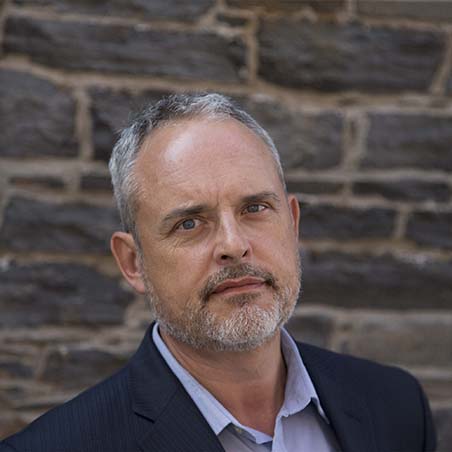Stephen Maher
Contributing Editor, Maclean’s Magazine
Bachelor of Arts, International Development Studies, 1988
I think that King’s, because it’s so small, helped me find how I fit into the world.
Throughout his 30-year journalism career, Stephen Maher has relocated several times and worked as a general reporter, restaurant critic, political reporter and magazine correspondant. While his career has continually evolved, one thing that’s held constant is its underpinning at King’s.
“I have continued to draw on the Foundation Year Program. It gives you a foundation—as advertised. It gives you the tutorial approach. It helps you develop a habit around critical thinking and textual analysis. I think it’s strong in that,” Stephen says.
After FYP, Stephen chose to major in international development, which he says broadened his perspective on the world, and his place within it.
“I was a bit of an odd duck,” says Stephen, of arriving at King’s as a 17-year-old “misfit” from Truro, N.S. “I think that King’s, because it’s so small, helped me find how I fit into the world.” Stephen says King’s is also the place where he found community: “My best friends in the world are friends from those days.”
He began his career in 1989 as a reporter for the Grand Falls Advertiser, in central Newfoundland. Stephen next worked as an editor and restaurant critic for Halifax’s Chronicle Herald newspaper, then moved to Ottawa with the Herald in 2004 to cover federal politics.
“I came to Ottawa when Paul Martin still had a majority. I covered that whole period. I covered Harper, managing to hang on,” Stephen says, referencing media downsizing over the past decade. “It’s not always been easy… It’s a buyer’s market for journalism.”
He has nonetheless persevered, and branched out into novel writing as well. His books include Salvage, Deadline and Social Misconduct, all of which are classified as thrillers.
In 2011 he moved to Postmedia News, where he began working as an investigative journalist and columnist. In 2012, he began investigating rumours that a political party had used robocalls—phone call that use a computerized autodialer to deliver a pre-recorded message, as if from a robot—through which fraudulent telephone messages sent voters to the wrong polling stations in the 2011 federal election. The resulting stories Stephen wrote earned him a National Newspaper Award, a Canadian Association of Journalists Award and the prestigious Michener Award for outstanding public service journalism. In his acceptance speech when receiving the Michener Award, he said of the robocall affair, “It has been a fascinating detective story, with burner phones, surveillance videos, digital call records, contradictory witnesses, red herrings and non-denial denials, but we still don’t know who done it.”
In 2016, Stephen attended Harvard University as a Nieman fellow. According to Harvard’s website, Nieman is a fellowship for select journalists who are invited to spend an academic year at Harvard in pursuit of individual study plans to strengthen their knowledge and leadership skills. It offers fellows the rare gift of time to think, learn, plan and create in a rigorous academic environment.
Today, Stephen is a contributing editor at Maclean’s Magazine, Canada’s national news magazine. He’s lately been writing about Coronavirus, including one personal story detailing his own experiences in and fleeing from Florida during the pandemic’s outbreak called Escape from Florida: My 2,400-km drive back to the sanity of Canada. It has garnered a lot of attention and feedback on both sides of the border.
“Overwhelming,” is how Maher describes reaction to the article. “[I got] A great number of messages from people saying ‘that’s like our experience’ … [and] people also responding to the ideas of social solidarity and social trust. I think that’s good. I’m also getting a steady number of messages from people in Florida. People are unhappy with me. They don’t like it. They say, ‘Don’t come back here. You’re an idiot.’ That kind of thing.”
Stephen says he doesn’t need for everyone to like his work, but he admits that it does create some strain to be reporting on the front lines of a pandemic. He forges on because he believes journalism is an essential service.
“I do believe the media play a vital role in times like this in helping people get information. That’s what we [journalists] spend our careers doing—trying to engage people and tell stories to them,” he says. Stephen cites the interplay between public health officials, government and the media, and how journalists challenge public institutions and hold them to account. “Nothing could be clearer than [that] this is an important function.”
April 2020
